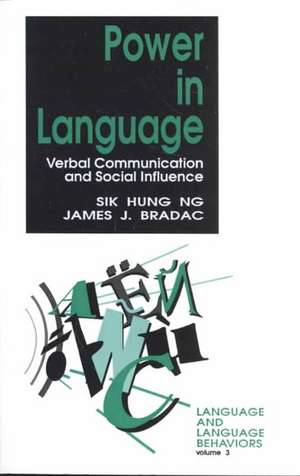Power in Language: Verbal Communication and Social Influence: Language and Language Behavior, cartea 4
Autor Sik H. Ng, James J. Bradacen Limba Engleză Paperback – 12 iul 1993
Preț: 789.26 lei
Preț vechi: 962.51 lei
-18% Nou
Puncte Express: 1184
Preț estimativ în valută:
151.04€ • 164.01$ • 126.88£
151.04€ • 164.01$ • 126.88£
Carte tipărită la comandă
Livrare economică 22 aprilie-06 mai
Preluare comenzi: 021 569.72.76
Specificații
ISBN-13: 9780803944237
ISBN-10: 0803944233
Pagini: 238
Dimensiuni: 141 x 213 x 15 mm
Greutate: 0.34 kg
Ediția:New.
Editura: SAGE Publications
Colecția Sage Publications, Inc
Seria Language and Language Behavior
Locul publicării:Thousand Oaks, United States
ISBN-10: 0803944233
Pagini: 238
Dimensiuni: 141 x 213 x 15 mm
Greutate: 0.34 kg
Ediția:New.
Editura: SAGE Publications
Colecția Sage Publications, Inc
Seria Language and Language Behavior
Locul publicării:Thousand Oaks, United States
Cuprins
Introduction
Signs of Power (I) - `Powerful' and `Powerless' Styles
Signs of Power (II) - More Variables, More Issues
Conversational Influence and Control
Mitigation - Be Indirect and Be Tentative
Misleading Words
Masking
Further Issues, Conclusions and Prospects
Signs of Power (I) - `Powerful' and `Powerless' Styles
Signs of Power (II) - More Variables, More Issues
Conversational Influence and Control
Mitigation - Be Indirect and Be Tentative
Misleading Words
Masking
Further Issues, Conclusions and Prospects
Descriere
This volume is a comprehensive analysis of research and theory on verbal communication and social influence. It examines a variety of empirical studies, theoretical positions, methodological matters and substantive issues pertaining to the use of language for generating influence and control. It moves from the basic concept of monological speech and the achievement of power to the increasingly complex and subtle cases of conversational control and linguistic depoliticization.
Topics such as linguistic signs of power, language as a resource for creating power and social causes of verbal power are examined in contexts ranging from informal conversations to newspaper headlines. The research scrutinized ranges from qualitative













